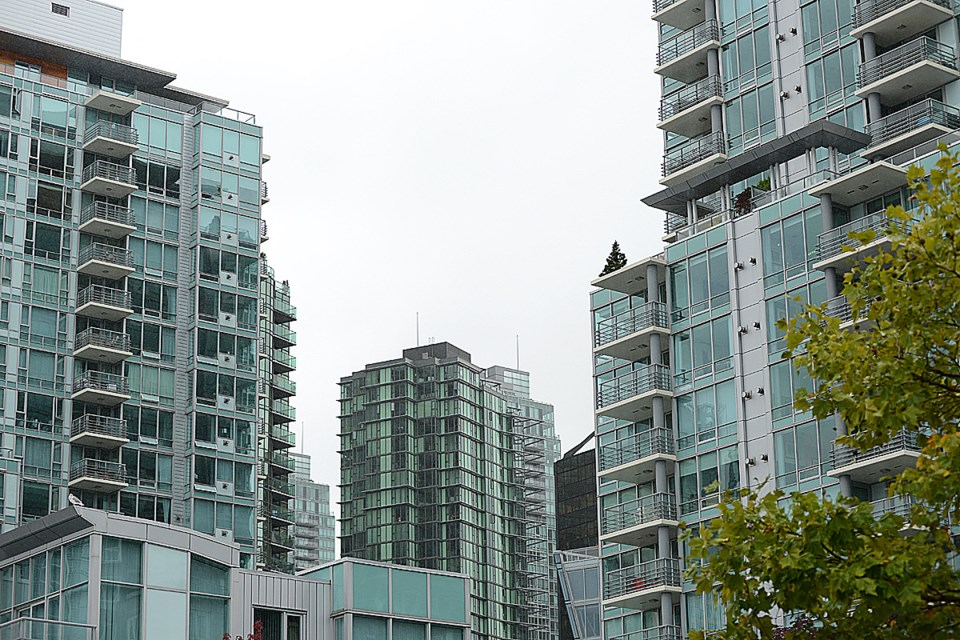While owners of single-family homes in Vancouver had the most immediate sticker shock from this year’s property value assessments, apartment building values have also increased sharply, and that will likely put even more upward pressure on rents.
Vancouver’s vacancy rate is currently 0.6 per cent, according to the Canada Mortgage and Housing Corp.’s fall 2015 rental market report. The average monthly rent for a one-bedroom apartment in the city’s downtown, including the West End, was $1,313 compared with $1,239 in 2014. In the same area, rates for one-bedrooms in new rental buildings or condos can easily top $2,000 a month.
The heated activity in multifamily rental was evident throughout 2015, but Mark Goodman, a principal at HQ Real Estate Services, described 2015’s last quarter as “insane,” when normal methods of appraisal and property pricing didn’t seem to apply.
“In that market we were consistently getting prices over the asking price even when we were aggressive,” Goodman said.
According to information Goodman provided to Business in Vancouver, total dollar volume for apartment building sales in Greater Vancouver increased 93 per cent in 2015 to $1.51 billion compared with $778 million in 2014. The average price per suite increased 17 per cent to $243,000.
In Vancouver’s upscale Kerrisdale neighbourhood, price-per-suite rose 38 per cent to $611,000, mostly because of redevelopment potential, while in the West End buildings appreciated 25 per cent with prices rising to $380,000 per suite. Other notable increases were seen in Marpole (14 per cent) and South Granville (29 per cent).
Buyers are both local players, who Goodman described as savvy investor groups with large holdings, and a small but disruptive number of buyers from mainland China who are focused on properties whose zoning allows them to be redeveloped.
“The money is pouring in so quickly from China and they’re buying these sites that they actually can’t afford to develop the properties right away,” Goodman said. “If you pay too much for the land, you can’t build condos and sell them off.”
Local buyers are more focused on existing buildings, where they plan to upgrade the building and increase rents, especially for new tenants (for existing tenants, rental increases in B.C. are currently capped at an annual 2.9 per cent increase).
The supply of rental housing is extremely tight in Vancouver, and Goodman doesn’t see the situation improving until more apartments are built. Tom Durning, a tenant advocate with the Tenant Resource and Advisory Centre, said Vancouver’s runaway home prices have put pressure on vulnerable renters because they now have to compete with younger people who have chosen to rent instead of buy.
In Vancouver, it’s difficult for building owners to get permission from the city to tear down existing rental buildings to build larger apartment buildings, which is what many owners would like to do, Goodman said. Goodman and his father, David Goodman, are proponents of relaxing the city’s current moratorium on demolishing older rental buildings in certain areas.
Goodman argued that displaced renters be given compensation or the right to return to the redeveloped building. But Durning said allowing for mass redevelopment would have dire consequences for tenants.
“Where are people going to go? There would be mass homelessness,” Durning said.
Durning’s organization supports the Canadian Federation of Apartment Associations (CFAA) in its call to restore federal tax incentives to build new rental housing.
“It’s the cost of land. You can’t build any sort of affordable housing unless there’s a subsidy, and the federal government got out of that 20 years ago,” he said.
The federal Liberals have promised to remove GST on new capital investments in rental housing. The CFAA has proposed eliminating the GST or HST on rental housing operations, increasing the rate of capital cost allowances and instituting a tax deferral if building owners are reinvesting in rental housing.
jstdenis@biv.com
@jenstden
For business news go to biv.com



